 Crime scene cleaning is extremely profitable for those who can handle difficult and unpleasant working conditions. In fact, this niche market of the multi-billion dollar janitorial and restoration industry is the fastest growing segment. Crime scene clean-up technicians are some of the highest-paid hourly workers, but they’re not the ones making the real money in death’s bloody aftermath. Let’s find out who is and exactly how this lucrative business works.
Crime scene cleaning is extremely profitable for those who can handle difficult and unpleasant working conditions. In fact, this niche market of the multi-billion dollar janitorial and restoration industry is the fastest growing segment. Crime scene clean-up technicians are some of the highest-paid hourly workers, but they’re not the ones making the real money in death’s bloody aftermath. Let’s find out who is and exactly how this lucrative business works.
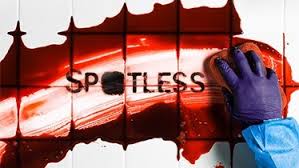 What got me curious about crime scene clean-up is when the Huffington Post asked me to write a feature article titled The Surprisingly Simple Clues Left Behind at Crime Scenes. The piece complimented the debut of a new Esquire Network TV series called Spotless which centers on a guy who runs a crime scene cleaning business that contracts for the Mafia to “sanitize” their hits.
What got me curious about crime scene clean-up is when the Huffington Post asked me to write a feature article titled The Surprisingly Simple Clues Left Behind at Crime Scenes. The piece complimented the debut of a new Esquire Network TV series called Spotless which centers on a guy who runs a crime scene cleaning business that contracts for the Mafia to “sanitize” their hits.
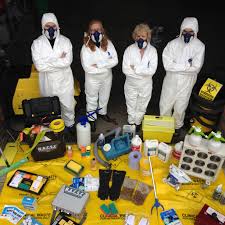 I’ve seen some horrifically messy death scenes as a homicide cop and coroner and I’ve worked under unspeakably nasty conditions. But once I finished the forensic process, it was someone else’s job to clean-up. I used to think Boy, I’m glad it’s not me.
I’ve seen some horrifically messy death scenes as a homicide cop and coroner and I’ve worked under unspeakably nasty conditions. But once I finished the forensic process, it was someone else’s job to clean-up. I used to think Boy, I’m glad it’s not me.
I never gave much thought to who was contracted, what equipment they used, what regulations they had to obey, what time it took, and certainly not how much it cost. I got my eyes opened when I looked into the business of crime scene cleaning.
First of all, it’s known in the industry as Crime and Trauma Scene Decontamination and Restoration—CTSDR. Secondly, they clean a lot more than just homicide and other death scenes.
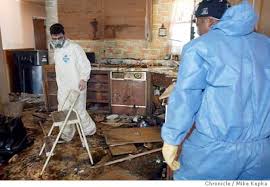 These professionals are handsomely paid to also remove and restore the effects of dead animals and their droppings, insects who hatched from decaying bodies, damage from police tools such as fingerprint powder, luminol, tear gas, pepper spray, and the cutting of materials during preservation of evidence. They deal with mold from marihuana grow-shows, deadly chemicals from meth labs, drug litter like contaminated needles, and body fluids across the spectrum.
These professionals are handsomely paid to also remove and restore the effects of dead animals and their droppings, insects who hatched from decaying bodies, damage from police tools such as fingerprint powder, luminol, tear gas, pepper spray, and the cutting of materials during preservation of evidence. They deal with mold from marihuana grow-shows, deadly chemicals from meth labs, drug litter like contaminated needles, and body fluids across the spectrum.
Their workplaces are everywhere imaginable—mansions to rooming houses, schools, offices, daycares, fields, playgrounds, boats, busses, trains, factories, shops and malls, cruise ships, vehicles, jail cells, police vehicles, hotels, and even on airplanes.
 You’d think that a grisly murder scene would be the most difficult and expensive situation, but those experienced in clean-ups say the life-long hoarder’s home is the worst—especially the animal hoarders—the crazy cat-ladies who die alone and then… you know… They call this “Gross Filth”.
You’d think that a grisly murder scene would be the most difficult and expensive situation, but those experienced in clean-ups say the life-long hoarder’s home is the worst—especially the animal hoarders—the crazy cat-ladies who die alone and then… you know… They call this “Gross Filth”.
There’s a fair overhead in the scene-clean business. A significant amount of equipment and training is required—specialized vehicles for transporting hazardous biological waste, mandatory certification by government departments, licensing requirements, expensive tools like ozone machines, steam injectors, and chemical foggers to destroy odors and pathogens, biohazard suits and containers, respirators, chemical-spill boots, gloves, goggles, as well as commercial disinfectors, solvents, and neutralizers.
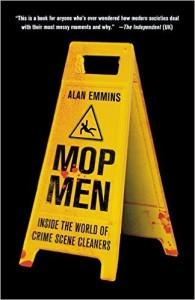 Employee turnover is high. Despite the high pay, burnout is inevitable. It takes a special person to fill the role. Strong stomach. Ability to detach emotionally. And serious attention to detail. Ever present is the danger of infection from a disease like HIV and hepatitis. Adherence to regulations like OSHA, WHMIS, DOT, EPA, NIOSH, Workers Comp, and professional industry governing bodies—the American Bio-Recovery Association, the National Crime Scene Clean-Up Association, and the National Academy of Crime Scene Cleaners—is required.
Employee turnover is high. Despite the high pay, burnout is inevitable. It takes a special person to fill the role. Strong stomach. Ability to detach emotionally. And serious attention to detail. Ever present is the danger of infection from a disease like HIV and hepatitis. Adherence to regulations like OSHA, WHMIS, DOT, EPA, NIOSH, Workers Comp, and professional industry governing bodies—the American Bio-Recovery Association, the National Crime Scene Clean-Up Association, and the National Academy of Crime Scene Cleaners—is required.
There’s a tremendous amount of information on the Crime Scene Clean-Up industry available online and two interesting books have been published, giving an insider’s look at the business:
So, yeah, yeah… these guys have a shitty job — you’re thinking — Get to the point. What do they charge? How much do they make?
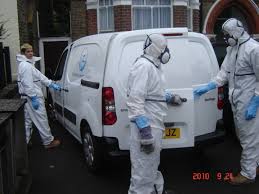 Well, this seems to be a fairly guarded secret in the crime scene clean-up circles. I did some more internet searching, then made some phone calls. The standard answer was:
Well, this seems to be a fairly guarded secret in the crime scene clean-up circles. I did some more internet searching, then made some phone calls. The standard answer was:
“The cost of remediating biohazards can vary dramatically from situation to situation, so we are not able to provide phone estimates or quote rates without coming out and doing a proper assessment which we charge an hourly fee for. By the way, are you insured?”
 Drilling down on the net, I found these sites which reported the average technician’s wage (not the business owner’s) as:
Drilling down on the net, I found these sites which reported the average technician’s wage (not the business owner’s) as:
- Payscale — 100K+ per year.
- Wisebread — 80K+ per year.
- Business Insider — $25.00 per hour training wage, extending to $40-50 experienced.
- CNN Money — 80-100K+ per year depending on location.


I have high respect for professional cleaners because what they are doing is not easy. I cannot even imagine myself in their place working on different kinds of substances. I really believe that they truly deserve these figures because of the difficulty of their job. And by any chance, do you know these crime and trauma scene cleaners? I have been seeing them a lot on the Internet these days. Do you think it is a good idea to hire them? Thanks!
I’ve never heard of them, Leonore. From their website they seem professional and legitimate. I suggest you contact them and if you get a good vibe, go for it 🙂
Since I started watching the TV show Spotless I’m learning so much about the clean up business. Great article Garry.
Thanks, Jillian. There’s far more to this business than I realized until digging into it. Not sure I’d want to do it – even for the amount they charge 🙁
Great article as always, Garry! The clean up guys came to my office immediately after burst pipes caused major flooding. I said to my boss, that’s the business to be in. He disagreed. I explained, I don’t want to be the guys in the hazard suits and masks who are cleaning the mess to prevent mold – I want to be the one who owns that business and gets the desperate phone call from a major commercial building owner in an area with lots of environmental regulations. I’d be retired now too.
Thanks, Valerie! No doubt the real money is in owning the business, even though there’s a fair overhead in wages and equipment. It’s a nasty job but – hey, someone’s gotta do it. And someone’s getting a big, fat bill once it’s done 🙂
Really interesting stuff Gary!
Hi Lorraine! Thanks and nice to see you visiting the site 🙂
That’s some sweet coin, Garry. For years Bob did asbestos removal, another job that’s hazardous to your health, and was paid handsomely. I guess the greater the risk, the greater the wage. Still, my hat’s off to the folks who clean crime scenes, etc. I could never do it. Interesting post, though!
Hi Sue! Yeah, you’re right about some serious coin. These guys earn their pay – don’t begrudge them one bit. I hope Bob doesn’t have any long-term health issues. Asbestos is nasty, nasty stuff.